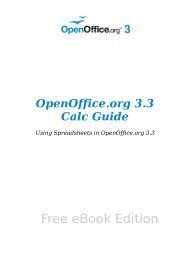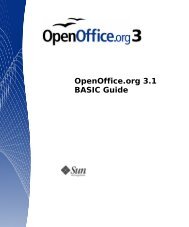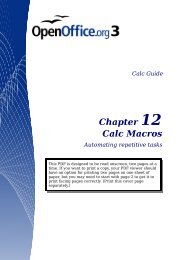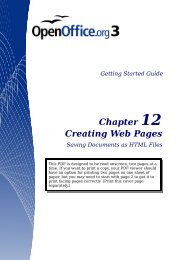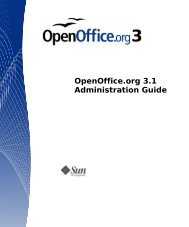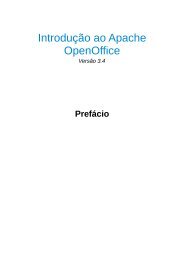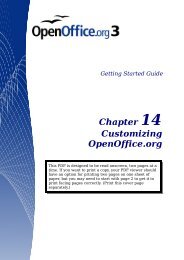OpenOffice.org BASIC Guide.pdf - OpenOffice.org wiki
OpenOffice.org BASIC Guide.pdf - OpenOffice.org wiki
OpenOffice.org BASIC Guide.pdf - OpenOffice.org wiki
You also want an ePaper? Increase the reach of your titles
YUMPU automatically turns print PDFs into web optimized ePapers that Google loves.
The StarDesktop 76<br />
The name of the StarDesktop object dates back to StarOffice 5, in which all document<br />
windows were embedded in one common application called StarDesktop. In the present<br />
version of <strong>OpenOffice</strong>.<strong>org</strong>, a visible StarDesktop is no longer used. The name StarDesktop<br />
was, however, retained for the frame object of <strong>OpenOffice</strong>.<strong>org</strong> because it clearly indicates<br />
that this is a basic object for the entire application.<br />
The StarDesktop object replaces the Application object of StarOffice 5 which previously<br />
applied as a root object. However, unlike the old Application object, StarDesktop is<br />
primarily responsible for opening new documents. The functions resident in the old<br />
Application object for controlling the on-screen depiction of <strong>OpenOffice</strong>.<strong>org</strong> (for example,<br />
FullScreen, FunctionBarVisible, Height, Width, Top, Visible) are no longer used.<br />
Whereas the active document in Word is accessed through Application.ActiveDocument and in Excel<br />
through Application.ActiveWorkbook, in <strong>OpenOffice</strong>.<strong>org</strong>, the StarDesktop is responsible for this task.<br />
The active document object is accessed in <strong>OpenOffice</strong>.<strong>org</strong> through the StarDesktop.CurrentComponent<br />
property, or through ThisComponent.<br />
ThisComponent<br />
The global name ThisComponent generally returns the same object as<br />
StarDesktop.CurrentComponent, with one significant advantage. If you are running from<br />
within the Basic IDE, debugging or exploring, then StarDesktop returns the Basic IDE<br />
itself. This is probably not what you want. ThisComponent returns the last previously active<br />
document.<br />
Basic Information about Documents in <strong>OpenOffice</strong>. <strong>org</strong><br />
When working with <strong>OpenOffice</strong>.<strong>org</strong> documents, it is useful to deal with some of the basic<br />
issues of document administration in <strong>OpenOffice</strong>.<strong>org</strong>. This includes the way in which file<br />
names are structured for <strong>OpenOffice</strong>.<strong>org</strong> documents, as well as the format in which files are<br />
saved.<br />
File Names in URL Notation<br />
Since <strong>OpenOffice</strong>.<strong>org</strong> is a platform-independent application, it uses URL notation (which is<br />
independent of any operating system), as defined in the Internet Standard RFC 1738 for file<br />
names. Standard file names using this system begin with the prefix file:/// followed by the<br />
local path. If the file name contains sub-directories, then these are separated by a single<br />
forward slash, not with a backslash usually used under Windows. The following path<br />
references the test.odt file in the doc directory on the C: drive.<br />
file:///C:/doc/test.odt<br />
To convert local file names into an URL, <strong>OpenOffice</strong>.<strong>org</strong> provides the ConvertToUrl<br />
function. To convert a URL into a local file name, <strong>OpenOffice</strong>.<strong>org</strong> provides the<br />
ConvertFromUrl function:<br />
MsgBox ConvertToUrl("C:\doc\test.odt")<br />
' supplies file:///C:/doc/test.odt<br />
MsgBox ConvertFromUrl("file:///C:/doc/test.odt")



